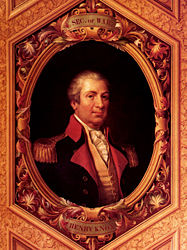April 25, 2008
Gratuitous Revolutionary War Geekery Posting

I am currently reading Henry Knox: Visionary General of the American Revolution by Mark Puls. A jacket blurb by Joseph Ellis calls it "unquestionably the authoritative biography", but something tells me it is, in fact, probably the only biography.
The book is entertaining and informative so far, except that Puls makes assertions from time to time that, absent cites or more detailed explanation, one must take on a certain amount of faith. For example, Puls states that Knox's fondness for street-brawling in his yoot in Boston was a vent for his frustration over the abandonment of his family by his father and his own need to quit school and go to work to support his mother and younger brother. Well, maybe, but I generally like to see the proofs of such psycho-analysis.
Anyhoo, there are many other more concrete facts about Washington's great artillery chief that I simply did not know until now. Here are three of them:
1. Knox was an eye-witness to the Boston Massacre, apparently going so far as to (unsuccessfully) try and break things up before they got out of hand. He testified at the subsequent military inquiries and was praised by all parties for his behavior at the scene.
2. Knox married a woman named Lucy Flucker. I certainly hope her family name was pronounced "Flooker", because otherwise it would have been quite unfortunate.
3. Knox managed to shoot two fingers off his own left hand in a hunting accident in the early 1770's. He never appeared in public afterwards without a scarf or some other covering carefully wrapped around it.
Posted by Robert at April 25, 2008 08:43 AM | TrackBackI believe he was a rope maker and gave critical testimony as to the intentions of the british officers and who actually gave the shoot order first. The things you learn while watching HBO! The John Adams miniseries began with that incident. Now I guess I am a geek too!
Posted by: Mrs. LMC at April 25, 2008 10:40 AMSocrates: "Geek!"
Posted by: Robbo the LB at April 25, 2008 03:35 PMI, too, have grave reservations whenever a writer tries to put historical figures on the couch. That's why I was so surprised by the new book (September, '07), For Liberty and Glory: Washington, Lafayette and their Revolutions. Written by a man named Gaines who is a former editor of Time, Life and--are you sitting down?--People magazine, I was expecting lurid detail and loads of pop psychology. Instead Gaines counters the prevailing understanding of the Washingtton/Lafayette friendship by poo-pooing the whole surrogate-father interpretation, insisting that it belittles both men, reducing Lafayette's real esteem to a "sort of neuroses". I admit he also delves into the doings of a marginal character, one cross-dressing French spy who really has nothing to do with the story--going so far as to dedicate one entire glossy page of illusrations to him/her. But beyond that slip (so to speak) and an absence of any sort of overview or wrap-up at the end, a thoroughly enjoyable work.
Posted by: Mr. Peperium at April 26, 2008 11:55 AMBy the way, Robbo, you mentioned Joseph Ellis; have you an opinion of his stuff? I have thoroughly enjoyed everything I've read so far from his word processor (that includes Founding Brothers, American Creation and 140 pages of American Sphynx).
In spite of where he teaches I find him even-handed, plausible, insightful and even humorous. And he refuses to treat subjects like slavery and Indian policy with the usual sniffiness and lack of perspective that hampers other historians.
Posted by: Mr. Peperium at April 26, 2008 12:06 PM

 Image courtesy of the lovely and talented
Image courtesy of the lovely and talented 